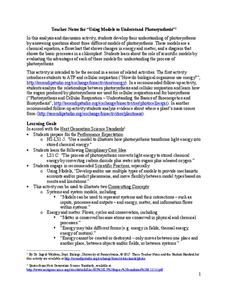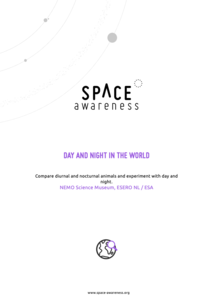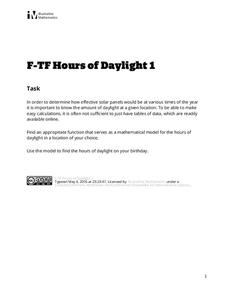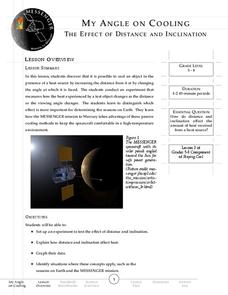Purdue University
Field Trip Snack Holder
Is light related to insulation? An informative hands-on STEM activity demonstrates how light affects temperature. First, the class investigates how light passes through different mediums and how that relates to temperature. Then,...
Serendip
Using Models to Understand Photosynthesis
Is your class in the dark about photosynthesis? Shed some sunlight on an important biological process with a thoughtful activity. After answering questions to help determine their level of knowledge, learners work with chemical equations...
Curated OER
Solar Kit Lesson #15 - Solar-Powered Electrolysis of Water and the Hydrogen Economy
An outstanding lesson awaits your physics fledglings! After reading about how hydrogen can act as an energy carrier, they examine the electrolysis of water using solar power. They test the gases produced for flammability and will...
Curated OER
Seein' Double, Seein' Double
By using the Internet, hands-on activities, video, and cooperative learning, pupils look into the conditions in which light casts shadows on objects. The lesson includes fabulous hands-on activities, art projects, worksheets, and reource...
Curated OER
The Reasons for the Seasons
Young scientists use a globe and a light to simulate the rotation of the earth and sun to show the seasons. Additionally, they simulate direct sunlight and indirect sunlight showing intensity of the sun, and answer questions based...
Nemours KidsHealth
Skin Cancer: Grades 9-12
Lather up! That's the takeaway from two activities that focus on skin cancer. To begin, class members read articles to gather information about sun exposure, tanning, and skin cancer. They use this information to design a pamphlet to...
American Chemical Society
Designing a Shade Structure
Bring the learning outdoors with an enjoyable activity about Earth's heating, sunlight, and shade. Scholars use problem-solving skills as they design, build, and test a sunshade structure. Participants view a video summarizing the...
Bonneville
Solar Pathfinder Tutorial
Find the right path to learn about solar energy. Scholars set up and use Solar Pathfinders to take measurements related to solar insolation at a particular site. Based on the data, they estimate the solar potential in kWh/m^2/day of a...
Bonneville
Solar Energy Equity and Sustainability
Generate some knowledge about generating electricity. Pupils first read several articles to learn about solar energy, its advantages and disadvantages, and advancements in technology related to solar cells. They then have a class...
NASA
Keeping Nine Eyes on the Weather
Take a look at climate change from another angle. Readers learn about the MISR instrument on the Terra satellite and how it studies Earth. Pupils experience how the multiple cameras give scientists multiple views so they can better study...
Radford University
Georgia Peaches and California Dreamin’
Plant the fruits of trigonometry. Pairs work through the process of finding the best place to plant fruit trees on a piece of property. The scholars must take into consideration the location of the property and the solar zenith angle. To...
Space Awareness
Seasons Around the World
Why does Earth experience summer, fall, winter, and spring? Using an informative demonstration, learners see how the angle of the sun on Earth and the rotation of Earth determine the seasons. Scholars work in pairs to learn that the...
Space Awareness
Making A Sundial
Can people really measure time just by using the sun? Scholars venture outside on a nice, sunny day to build sundials and learn how people measured time 600 years ago. The class builds two different sundials while gaining practice with...
Purdue University
Sun Tracking System for a Solar Panel
Capture the Sun's rays as best as possible. An engaging STEM lesson teaches scholars about how Earth's tilt causes the path of the sun to change throughout the year. They create solar panel systems that move both horizontally and...
Space Awareness
Day and Night in the World
How do different parts of the world experience day and night? Introduce scholars to the concept of global citizenship while teaching about animal behavior with discussion of nocturnal and diurnal animals. Then, learners complete...
Arbor Day Foundation
Trees are Terrific...Inside and Out!
Trees are the star of a three-step unit celebrating Arbor Day. Step one takes an in-depth look into the structure of a tree, the process of photosynthesis, and the benefits of the leafy giants. Step two challenges scholars to create a...
PBS
Insolation on Earth
In 2017, the world increased the capacity for using solar energy by a whopping 32 percent. Is solar energy the future for the planet? Approach this topic from the idea of how much solar energy reaches the surface of Earth. Individuals...
Serendip
Photosynthesis and Cellular Respiration
How does energy from the sun make plants grow? Scholars move step by step through the processes that promote plant propagation during a detailed lesson. The resource illustrates ADP production and hydrolysis, then allows learners to...
Concord Consortium
Sunlight, Infrared, CO2, and the Ground
How bright are your classes? An interactive lesson has scholars explore how light interacts with carbon dioxide in the air and the surface of the earth. They watch a temperature scale as light interacts with the environment.
Skcin
Sun Safe Summer Activity Pack
Eight activities make up a packet all about sun safety. Scholars mix and match how animals stay sun safe, dress paper dolls in appropriate summer clothing, make a cootie catcher, solve word puzzles, grow sunflowers, examine...
Cornell University
Sun or Water? or Both?
Over the course of 10 days, young scientists observe their cups of seed and soil—one that gets sun and water and one that gets no sun and only water. Then they reflect on the results of the experiment to determine if their hypothesis was...
Houghton Mifflin Harcourt
That’s Amazing!: English Language Development Lessons (Theme 3)
That's Amazing! is the theme of an English language development unit created by Houghton Mifflin. Following a speak, look, move, and listen routine, scholars delve into topics; seasons, weather, animals, landforms, telling...
Illustrative Mathematics
Hours of Daylight 1
The midline of the mathematical model of the number of hours of sunlight is not 12 hours. Pupils use the modeling cycle to determine a function that will model the number of hours of sunlight at a location of their choosing. Using...
Messenger Education
My Angle on Cooling—Effect of Distance and Inclination
When exploring Mars, spacecrafts are exposed to 5-11 times more sunlight than when near Earth. Groups of pupils complete a hands-on activity to explore how distance and angle of the sun affect temperature. Through discussions, they then...

























